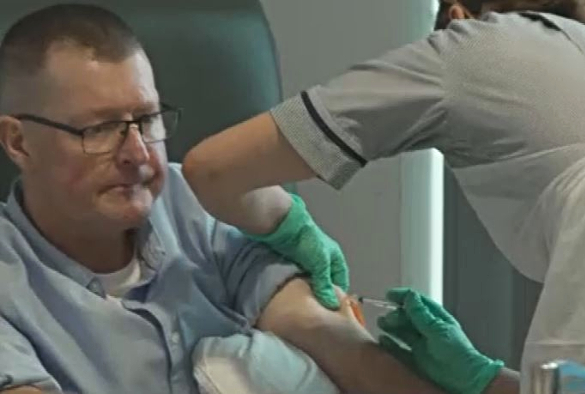A Merseyside man has become the first in the UK to receive a ‘vaccine’ that is hoped will stop his recurring head and neck cancer from returning – in a clinical research trial which may help bring further ground-breaking treatments for the disease.
Patient Graham Booth was given an injection of a therapy tailor-made to his personal DNA and designed to help his own immune system ward off cancer permanently.
Dad-of-five Graham, 54, will have a year-long course of these immunotherapy injections at The Clatterbridge Cancer Centre as part of a research project designed to reduce deaths and recurrence in head and neck cancers, including of the throat, neck, mouth and tongue.
The Transgene study involves researchers from the University of Liverpool, The Clatterbridge Cancer Centre, Liverpool Head & Neck Centre and Liverpool University Hospitals.
Chief Investigator for the UK trial, Professor Christian Ottensmeier, Professor of Immuno-Oncology at the University of Liverpool and a Consultant Medical Oncologist at The Clatterbridge Cancer Centre, said: “It is a really exciting day in this important and potentially game-changing research.
“To have reached the stage of a patient receiving this treatment that only a few years ago was thought of as science fiction, is truly amazing.”
Professor Ottensmeier said more patients were in the process of joining the trial at Clatterbridge and they would be offered individualised treatments, which could benefit them greatly, as well as expanding the team’s knowledge of personalised cancer therapies that could eventually help people with other cancer types.
“We are really grateful to Mr Booth that he has agreed to participate on this clinical research trial,” said Professor Ottensmeier. “It is wonderful that we have been able to move from the theoretical stage of this research into creating a treatment for real people. We have all waited so long for this day to come. We think this will make a real difference to the patients we treat at Clatterbridge.”
Professor Ottensmeier said patients would also have a better experience with this treatment – which is manufactured in France by biotechnology company Transgene – as there would be far fewer side effects because healthy tissue and cells would not be damaged, as is usually the case in chemotherapy and radiotherapy.
He said: “It is unlikely that this treatment will cause meaningful side-effects in our patients but likely it will cause very meaningful benefits.”
Graham, of West Kirkby, said he was not worried about being the first person in the UK to receive this pioneering treatment and that it “opened new doorways” which gave him hope that the cancer would not come back.
Graham said: “When I had my first cancer treatment in 2011, I was under the impression that the cancer would not return. My biggest fear was realised in 2016 when it came back and then in 2019 and then two cases in 2021.
“Last year I had the feeling of the cancer progressing and there were not a lot of options left.
“This clinical trial has opened new doorways and gives me a bit of hope that my cancer won’t come back. And this could open doorways for other people.
“I’m hopefully looking at a brighter future. A bit of hope that it never returns again – which would mean the world to my family and everyone around me.”
Read the original news story by The Clatterbridge Cancer Centre.
